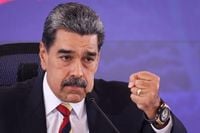On the morning of October 3, 2025, the Trump administration unleashed a fourth deadly military strike this month against a speedboat suspected of ferrying narcotics toward the United States. The attack, executed in international waters just off the coast of Venezuela, killed four men whom U.S. officials described as “narco-terrorists” affiliated with designated terrorist organizations. The strike, confirmed by Defense Secretary Pete Hegseth, marks a dramatic escalation in Washington’s ongoing campaign against maritime drug trafficking in the Caribbean and has ignited fierce debate both at home and abroad about the legality and motives behind such operations.
According to the Pentagon, the targeted vessel was intercepted on a well-known narco-trafficking transit route. Hegseth, in a social media post, was unequivocal: “Our intelligence, without a doubt, confirmed that this vessel was trafficking narcotics, the people onboard were narco-terrorists, and they were operating on a known narco-trafficking transit route. These strikes will continue until the attacks on the American people are over!!!!” He attached video footage of the attack, showing a small boat skimming across the water before it suddenly exploded, sending debris and flames into the air.
President Donald Trump himself amplified the message, sharing the same video on his Truth Social platform, writing, “A boat loaded with enough drugs to kill 25 TO 50 THOUSAND PEOPLE was stopped, early this morning off the Coast of Venezuela, from entering American Territory.” The president’s statement underscored the administration’s view that the operation was not only justified, but necessary to protect American lives.
This latest strike is part of a broader trend. Over the past five weeks, U.S. forces have destroyed five boats in the Caribbean, all allegedly carrying narcotics destined for the United States. Since September, a total of 21 people have been killed in these operations, according to U.S. media reports. The Trump administration has told Congress that the country is now in an “armed conflict” with drug cartels, a designation intended to justify the use of military force without the need for judicial process. As reported by the Associated Press and other outlets, the administration is labeling the crews of these boats as combatants, drawing a legal distinction that has not been universally accepted.
The military buildup in the region is significant. The U.S. Navy currently has eight warships and more than 5,000 sailors and Marines deployed to the Caribbean, a force the administration says is necessary to stem the flow of narcotics and protect American communities. Defense Secretary Hegseth has been adamant that the strikes will continue as long as the threat remains.
Yet the policy has not gone unchallenged. Legal experts and lawmakers in the United States have questioned the legality of targeting alleged criminals with military assets, especially in international waters. Critics argue that the administration’s approach bypasses due process and risks setting a dangerous precedent for the use of force against non-state actors.
International reaction has been swift and, in some cases, sharply critical. Colombian President Gustavo Petro, in a pointed social media post, condemned the U.S. strike, arguing that those killed were not terrorists but “poor young men from the Caribbean islands trying to survive.” Petro went further, likening the use of missiles to “murdering the Caribbean people” and drawing a stark comparison to military tactics used in other conflict zones. “No, Mr. War Secretary, the young men who are on those boats are not narco-terrorists, they are poor young men from the Caribbean islands trying to survive. By bombing them with missiles like in Gaza, you are murdering the Caribbean people,” Petro wrote. He also claimed that Colombia seizes far more cocaine than the U.S. Navy “without killing anyone.”
Petro did not stop at humanitarian concerns. He accused the Trump administration of ulterior motives, alleging that its real goal was to “harass us to get the oil for free,” referring to Venezuela and neighboring Guyana’s petroleum reserves. “The use of anti-economic and murderous missiles has another goal. You want to harass us to get the oil for free,” he charged.
Venezuelan officials have also pushed back. President Nicolas Maduro, who has faced relentless U.S. pressure and sanctions, tried to open a dialogue with Trump, offering to help round up criminals from the notorious Tren de Aragua gang and even sending Venezuelan troops to combat guerrilla encampments. These overtures, however, have failed to ease Washington’s stance. Instead, the U.S. continues to press its campaign to paint Maduro as a cartel leader, further straining already fraught relations between the two countries.
Venezuelan Defense Minister Vladimir Padrino Lopez added fuel to the fire on October 2, claiming that five U.S. jets had approached the country’s coastline in what he described as “military harassment.” “I am denouncing this military harassment in front of the world,” Padrino said in a televised address. “This is a great threat.” He did not specify exactly where the incident took place or what response, if any, the Venezuelan government might take.
The Trump administration’s strategy is rooted in a recent policy shift. On October 1, President Trump declared drug cartels to be unlawful combatants, effectively placing them in the same category as enemy fighters in a war zone. According to a memo obtained by the Associated Press, this declaration paved the way for the U.S. to treat its battle against cartels as an “armed conflict,” a move intended to bolster the legal case for military strikes.
Supporters of the policy argue that extraordinary threats require extraordinary measures. They point to the sheer volume of narcotics flowing toward U.S. shores and the devastating impact of the opioid and synthetic drug epidemic on American communities. For them, the use of military force is both justified and overdue.
But critics, including some within the international community and human rights organizations, warn that the approach risks blurring the line between law enforcement and warfare. They caution that labeling suspected criminals as combatants could erode legal protections and open the door to further escalation, both in the Caribbean and beyond.
For now, the Trump administration shows no sign of backing down. “These strikes will continue until the attacks on the American people are over!!!!” Hegseth declared, echoing the administration’s hardline stance. As the U.S. Navy patrols the Caribbean and diplomatic tensions simmer, the world watches to see whether this new front in the war on drugs will bring results—or trigger even greater instability in a region already on edge.
The aftermath of the October 3 strike leaves little doubt: the battle lines are drawn, and the stakes—for both sides—could hardly be higher.


